The number of COVID-19 cases caused due to COVID-19 is rising worldwide, nearly 7 months after it was first detected. Being a respiratory pathogen, the virus affects both the upper and lower respiratory tract of humans.
With no known cure in sight, and vaccine development still in process, panic has once again gripped everyone after a group of scientists have suggested findings which support the possibility of the COVID-19 virus to be airborne. This means that the risk of transmission of the virus is much higher than what was originally thought.
As per the World Health Organisation (WHO), the airborne transmission may be possible in specific circumstances and settings. These include settings in which medical procedures that generate droplets (smaller than 5 microns) from patients such as bronchoscopy or disconnecting a patient from the ventilator. These droplets could be suspended in the air for some time before settling down on surfaces.
Till date, social distancing and hand washing are the measures suggested by the WHO in order to prevent people from contracting the disease.
Transmission of novel coronavirus occurs much more commonly through respiratory droplets than through surfaces/objects.
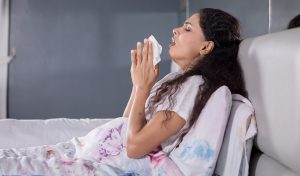
Transmission of virus can occur through direct, indirect, or close contact with infected people through saliva and respiratory droplets which are expelled when an infected person coughs, sneezes & talks. In these situations, respiratory droplets that include the virus can reach the mouth, nose or eyes of a healthy person and can result in infection. Indirect contact transmission involving contact of a person with a contaminated object or surface may also be possible.
Covid is very contagious and people who get infected with the coronavirus can spread it to others 2 to 3 days before symptoms start and are most contagious 1 to 2 days before they feel sick.
Dr. Ashish Bajaj, M.B.B.S., M.D.
Airborne transmission can be explained as the spread of infectious droplets that are released in air over long distances and time. These transmissions can occur during medical procedures that generate droplets or through an infected individual.
A susceptible person could inhale aerosols and could become infected if the aerosols contain the virus in enough quantity to cause infection within the recipient. However, enough proportion of exhaled droplets that evaporate to generate aerosols is required to cause infection in another person is not yet known, but it has been studied for other respiratory viruses. Thus, much more research is needed given the possible implications of such a route of transmission.
The primary mode of transmission of SARS-CoV-2 is via exposure to respiratory droplets carrying the infectious virus from close contact or droplet transmission from presymptomatic, asymptomatic, or symptomatic individuals harboring the virus.
Dr. M.G. Kartheeka, MBBS, MD
There is still not enough or convincing evidence to prove that novel coronavirus is airborne. The experts believe that even if there is no ‘significant’ proof that COVID-19 can be transmitted through droplets. However, the experts suggest that the virus is more infectious in closed settings, without proper ventilation.
They also point out that the idea of droplet transmission due to droplets hanging in the air for a long period of time is capable of infecting a healthy person.
Now more than ever, it is absolutely necessary that you always wear a face mask when you are out of the house.
Asymptomatic patients can be carriers and spreaders of the virus as well. Hence it is essential to maintain social distance (more than 6 feet) when you are outdoors.
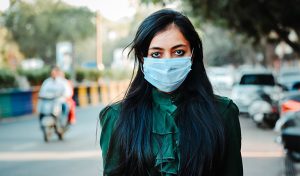
Older adults and people with serious chronic medical conditions are at higher risk of serious illness.
Wash your hands with soap or water/ alcohol-based sanitizer frequently. Avoid touching your nose, mouth, or eyes. Make sure that you cover your nose and mouth while sneezing or coughing.
There are chances that a person can get COVID-19 by touching a surface or object. Use common household disinfectants to clean and disinfect frequently touched surfaces such as tables, doorknobs, handles, phones, and switches.

The virus that causes COVID-19 can lead to some flu-like symptoms, such as aches, fever, and cough. If you experience any of these symptoms, you should get in touch with your doctor immediately.
We are yet to completely understand the extent of airborne transmission of coronavirus due to poor ventilation & through infect or an asymptomatic person. Many such unanswered questions about transmission of the virus are still pending and research to seek these answers is ongoing and encouraged.
Pregnancy is a special time full of delight and expectations. But being pregnant can also be stressful. Understandably, you may be worried about the impact of coronavirus disease (COVID-19) on your as well as your baby’s health.
Research is currently being undertaken to evaluate the impacts of COVID-19 infection on pregnant women. Data are limited, as per the ICMR (Indian Council for Medical Research) at present, there is no evidence of scientific literature to suggest that pregnant women are at higher risk of developing a serious illness as compared to the general population.
However, pregnancy itself alters the body’s immune system. Pregnant women can be badly affected by certain respiratory infections, including COVID-19. Hence, pregnant women must take precautions to protect themselves and inform their doctor if they develop any symptoms such as fever, cough or difficulty in breathing.
If you have or think you have COVID-19, you must isolate yourself at home. Mothers can still hold baby skin-to-skin and stay in the same room as them but should wash hands and wear a mask, especially when bonding and breastfeeding.
Dr. M.G. Kartheeka, MBBS, MD
If you are pregnant, you should take the same precautions to avoid COVID-19 infection as other people. You can help protect yourself with these steps:
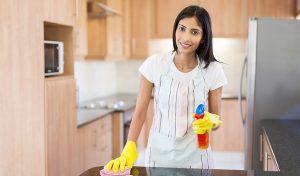
Pregnant and postpartum women have a higher risk for more severe illness from COVID-19 than non pregnant women.
Dr. Ashish Bajaj – M.B.B.S, M.D.
Emerging evidence now suggests that passage of COVID-19 from mother to baby is probable, although the proportion of pregnancies affected and the significance to the neonate has yet to be determined. At present, there are no recorded cases of breastmilk or secretions from the vagina that have been tested positive for COVID-19. There is currently no scientific evidence suggesting an increased risk of miscarriage or early pregnancy loss concerning COVID-19. (ICMR, Guidance document, dated 12 April 2020).
Stay healthy by getting a COVID-19 vaccine, following guidelines from your doctor, and keeping your prenatal and postpartum care visits, as there is an increased risk of pre-term birth.
Dr. Ashish Bajaj – M.B.B.S, M.D.
Prenatal visits are important to ensure maternal and fetal health. However, given the current global pandemic, we are facing, many obstetricians are either increasing the interval between visits or encouraging telehealth visits.
As per ICMR guidance, pregnant women are advised to attend routine prenatal checkups at 12, 20, 28 and 36 weeks of gestation, unless they meet current self-isolation criteria. For women who have had symptoms of COVID-19, appointments can be postponed until 7 days after the start of symptoms, unless they become severe.
For women who are self-quarantined because someone in their household has possible symptoms of COVID-19, appointments should be deferred for 14 days.
If you are concerned about attending your appointment due to COVID-19, talk to your doctor. Establish a trusting relationship with your doctor and freely ask them any doubts or concerns you may have regarding your pregnancy and delivery.

An important thing to do once your baby is born is to discourage visitors. Also, ensure that all those who are caring for the baby (you and your family) frequently wash hands and wear face masks.
You can safely touch, hold and breastfeed your baby since transmission of the virus through breast milk has not been reported to date (limited scientific data available suggest this is not likely to be a source of transmission). Wear a medical mask when you are in any contact with the baby, even while feeding. Mothers should also follow other measures of preventing infections, such as washing hands, sneezing or coughing in a tissue, wiping down surfaces, etc.
In case of temporary separation of the newborn from a mother with suspected or confirmed COVID-19 (to reduce the risk of spreading the virus to the newborn) following precautions should be taken.

Pandemics can be stressful for everyone. Fear and anxiety about a disease can be overwhelming for both adults and children. Depression during and after pregnancy is common and can be treated. Postpartum depression is the depression that can happen after having a baby. If you think you may be experiencing depression, seek treatment from your doctor as soon as possible.
As the saying goes, it helps to be prepared, not scared. Simple steps like regular hand washing and avoiding crowds can go a long way in protecting you and your baby. Do not stress if your due date is coming close. Hospitals have systems in place to ensure safe deliveries and reduce the risk of infection to newborns. Stay healthy and stay protected.
Also Read: Foods That Fight Nausea During Pregnancy: Guide For Expecting Mothers
Disclaimer: The information provided here is for educational/awareness purposes only and is not intended to be a substitute for medical treatment by a healthcare professional and should not be relied upon to diagnose or treat any medical condition. The reader should consult a registered medical practitioner to determine the appropriateness of the information and before consuming any medication. PharmEasy does not provide any guarantee or warranty (express or implied) regarding the accuracy, adequacy, completeness, legality, reliability or usefulness of the information; and disclaims any liability arising thereof.
Links and product recommendations in the information provided here are advertisements of third-party products available on the website. PharmEasy does not make any representation on the accuracy or suitability of such products/services. Advertisements do not influence the editorial decisions or content. The information in this blog is subject to change without notice. The authors and administrators reserve the right to modify, add, or remove content without notification. It is your responsibility to review this disclaimer regularly for any changes.
The number of COVID-19 cases in India has already crossed the 1.8 lakh mark and continues to steadily rise each day. Staying indoors can help us prevent COVID-19 from spreading. It is also essential for us to maintain personal hygiene as well as hygiene at home to minimize our chances of getting sick.
Transmission of novel coronavirus occurs much more commonly through respiratory droplets than through objects. Current evidence suggests that COVID-19 may remain active for hours to days on different types of surfaces. Therefore, cleaning visibly dirty areas followed by disinfection is the best measure for the prevention of COVID-19 in day to day practice.
Cleaning is the process of removal of germs, dirt, and impurities from a variety of surfaces. It does not kill all germs, but removing them, lowers their numbers and the risk of spreading infection. Disinfection is the process of using chemicals (disinfectants) to kill germs present on different surfaces. If done correctly, it can kill harmful microorganisms. Dettol, Lizol, bleach, rubbing alcohol, sodium hypochlorite, etc. are the various types of disinfectants that are easily available.
According to CDC Disinfection to reduce transmission of COVID-19 at home is likely not needed unless someone in your home is sick or if someone who is positive for COVID-19 has been in your home within the last 24 hours. Clean high-touch surfaces such as doorknobs, tables, and light switches regularly.
Dr. M.G. Kartheeka, MBBS, MD
This is probably the most touched surface in the house. Right from the front door of your house to the handles on cupboard doors and rooms, it is vital to make it a habit to disinfect and wipe all the door handles in the house. Don’t forget to clean and disinfect the refrigerator door handle, table surfaces, metal/plastic/rubber baby toys, chairs and desk surfaces as well.
Think of your mobile phone as your third hand. We tend to check our phones at least 20-30 times a day, helping germs easily transfer from your hands to your mobile phone. Phones should preferably be cleaned with disinfecting wipes gently on exterior parts of phones in switched off mode. Avoid the use of bleach or the entry of moisture through any openings. Many mobile companies have provided recommendations on the cleaning of phones during this COVID-19 pandemic. Check your phone manufacturer website for instructions on what to use to clean your phone to avoid damage to the device.
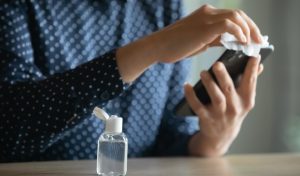
Surfaces must be cleaned with water and soap or a detergent first to remove dirt, followed by disinfection, if you do sanitize or disinfect, clean surfaces first because impurities like dirt may make it harder for sanitizing or disinfecting chemicals.
Dr. Ashish Bajaj – M.B.B.S, M.D.
While you might not be touching your face regularly, you still touch your spectacles very often. Wipe your spectacle frames with a disinfecting wipe or a cloth dampened with disinfectant liquid*. You can also use a sanitiser and a clean, lint-free towel to wipe the lenses.
Cleaning our laptops is more important than ever now that we are working from home. Use a disinfectant wipe or a soft, lint-free cloth and wipe on the top and sides of each key, preferably in a switched off mode. Also, clean the surface and bottom of the keyboard thoroughly. Entry of moisture or any disinfectant liquid through any openings must be avoided.

We all find ourselves watching quite a bit of TV during this lockdown. This means that your remotes need a good cleaning since it is being handled by everyone at home. Remember to clean and disinfect your remote gently with a disinfectant wipe or a cloth soaked in disinfectant liquid. Needless to say, the entry of moisture and disinfectant liquid inside the remote control must be avoided during cleaning.
Every packed grocery item should be wiped with soapy water or sanitiser (food packets, food bags, etc.) While purchasing groceries, make sure that you use cloth bags. Wash and disinfect them after every purchase.
Clean your fruits and vegetables under running water. You may soak them in a solution of salt or baking soda with water for some time. Rinse the items with clean water, dry and store them normally.
If you are visiting the grocery or vegetable store, it means that you are taking your purse/wallet out. Add your wallet to the list of things you need to sanitize after visiting a store. Use a small amount of hand sanitiser* applied to the surface of the purse with a tissue or a clean cloth. You can disinfect keys (without remote controls) and coins by soaking them in a soap solution of dishwashing liquid for a short amount of time. After this, rinse them with clean water and leave them in the sun to dry. As far as possible, try and use digital or card payments instead of cash. After handling/touching a card or cash for transaction/payment, always clean your hands with an alcohol-based hand sanitiser.
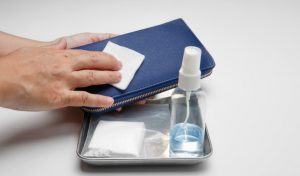
Nowadays, you are probably using your kitchen counter numerous times a day. Areas where food is stored or prepared have more microbial contamination than other places in the home.
Have you stopped to think about the number of times you switch on and off the lights and fans at home? Switches and doorbells can be cleaned with disinfectant wipes once every couple of days.
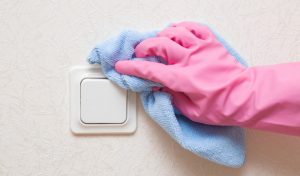
*Disinfectant wipes should have at least 60% ethanol or 70% isopropanol content while sanitisers should have at least 60% ethanol content.
It has become more important than ever to make sure that our houses stay virus-free and clean. Make sure you wash your hands regularly to minimize the spread of germs inside your house. Stay safe!
Disclaimer: The above information has been prepared by a qualified medical professional and may not represent the practices followed universally. The suggestions listed in this article constitute relatively common advice given to patients, and since every patient is different, you are advised to consult your physician, if in doubt, before acting upon this information. Lupin Limited has only facilitated the distribution of this information to you in the interest of patient education and welfare.
The news about the COVID-19 pandemic is everywhere: from the front pages of newspapers and headlines on news channels, to even our daily conversations at our homes. Constant exposure to such updates can leave us overwhelmed. Children especially can begin to feel increasingly anxious and confused since their daily routines have been completely disrupted due to the current state of lockdown.
So, how can parents help their kids manage their fears, while at the same time be aware and alert themselves? As a parent or guardian, you will want to make sure that your children get answers to all their questions and doubts regarding coronavirus. Speaking to them can help clear their doubts, help them understand what is happening as well as make them feel safe and cope with the current situation.
Most children have already heard about COVID-19 from TV as well as seen people wearing face masks. Therefore, not talking to them will make them even more confused. Ask them what they’ve heard about coronavirus and if they have any questions or doubts regarding this. This will help you understand how much they know as well as if they have any wrong information.
Explain things to them in a calm and reassuring way. Don’t offer more information than what they ask about. If they ask something that you don’t know the answer to, let them know about it. If they require information (especially older children), help them get access to age-appropriate content so that they don’t end up watching the news which scares them.
Teach children that following good habits like regularly washing their hands, covering their mouth and nose while sneezing and coughing, eating healthy food, getting proper sleep can help them stay in good health and even help in avoiding the spread of the infection to others.

Watching news such as the number of infected cases or even the death rates worldwide can frighten children. Younger children may feel reassured if you let them know that doctors and nurses in hospitals are treating and taking care of people who get sick. Older children may also feel comforted by knowing that scientists and researchers are working on a vaccine for COVID-19. Watch the news with your children so that you are aware and can filter what kind of information they are obtaining.
Children tend to worry more about their family and friends than themselves. If they hear that older adults are more likely to fall sick, they may get worried about their grandparents. Help them call or video call their grandparents and relatives to reassure them that they are in good health. Helping them connect virtually with their friends will make them feel a sense of normalcy.
Children might feel anxious and upset due to the lockdown and the fact that they have to be constantly indoors. Remind them that it is alright to be upset right now and encourage a hopeful outlook for the future.
Stick to or create new family routines, such as learning or studying, mealtimes, chores, playtimes and bedtimes. This can help children feel in control of the situation.
There may be times of constant news about COVID-19 from all types of media that may heighten fears about the disease. Limit reading, hearing or watching the news. Also, limit social media use that may expose your children to rumours and false information. Be cautious about discussing the news and your fears in front of your children.
Connect with friends and family members using the phone and video calls. This can help them avoid feeling isolated and can build and maintain relationships.

If you observe persistent problems with your child’s sleep patterns, eating habits or difficulty concentrating on typical tasks, or if your children have a persistent sense of hopelessness, excessive sadness or overwhelming worry, contact your doctor for advice.
It is important to continue having open communication with your family. If your child is afraid or anxious, you don’t want them to keep it to themselves. While we don’t know when these stressful times will end, we can definitely offer comfort and reassurance to our children, discuss factual information and encourage a healthy dialogue about their feelings.
Also Read: Constipation in Kids: A Research-Based Guide for Parents
Disclaimer: The information provided here is for educational/awareness purposes only and is not intended to be a substitute for medical treatment by a healthcare professional and should not be relied upon to diagnose or treat any medical condition. The reader should consult a registered medical practitioner to determine the appropriateness of the information and before consuming any medication. PharmEasy does not provide any guarantee or warranty (express or implied) regarding the accuracy, adequacy, completeness, legality, reliability or usefulness of the information; and disclaims any liability arising thereof.
Links and product recommendations in the information provided here are advertisements of third-party products available on the website. PharmEasy does not make any representation on the accuracy or suitability of such products/services. Advertisements do not influence the editorial decisions or content. The information in this blog is subject to change without notice. The authors and administrators reserve the right to modify, add, or remove content without notification. It is your responsibility to review this disclaimer regularly for any changes.
In these uncertain times, you could find yourself anxious, stressed and nervous about the future. Researchers have observed that large-scale disasters such as pandemics, tend to cause an increase in mental health issues such as depression, substance abuse and behavioural disorders.
The regular news of the current COVID-19 pandemic, with its vast number of infected cases as well as casualties, is mentally affecting more people each day.
Lockdowns have been imposed by certain countries including India to contain the spread of the virus. Long durations of being indoors lead to feelings of restlessness, annoyance, financial pressures, isolation, boredom and disinterest.
These feelings are completely natural and reasonable and reflect our want for survival. That said, it is important to keep in mind that although worry is normal, panic can prevent us from being rational/logical, which are skills we need at times of such difficulty.
1. Limit your news/media exposure: We are constantly exposed to extensive information about COVID-19 through the news, social media, discussions with family and friends. Constant exposure to such news creates negative effects such as feelings of anxiety, fear and stress. Take measures to ensure that you are away from receiving and spreading rumours and false information. Follow reliable news resources. Avoid watching the news all the time but stay updated regarding the guidelines and precautions advised by the Ministry of Health and local public health authorities.
2. Plan activities with your family: The lockdown has allowed us to spend time with our families which was not possible earlier, because of our hectic lifestyle. However, spending too much time together also has its drawbacks. Irritation, anger and frustrations arise because we are restricted from going out. Try and plan fun and relaxing activities which the whole family can participate in, such as board games, movies, arts and crafts or even exercising. Children tend to get irritable since they cannot go out and play, so engage them in activities like games or involve them in household activities. This will help in keeping them occupied as well as ensure more helping hands for household chores.
 3. Stay connected: Take out some time during your day to connect virtually with your near and dear ones who stay away, especially those who are elderly or alone. Catch up with your friends or social circle online through video calls. Check up on the elderly or disabled in your neighbourhood and offer to help if they need something. Such deeds will have a positive impact on your mental state.4. Relax and Meditate: You do not have to be occupied all the time. Sometimes it’s nice to take a break and do nothing but relax and breathe. Set aside some quiet time for yourself where you can do something relaxing like taking a long bath or reading a book. Practices such as yoga and meditation are very beneficial in case you feel overwhelmed or anxious.Read More: 7 Different Relaxation Techniques to Help Fight Stress
3. Stay connected: Take out some time during your day to connect virtually with your near and dear ones who stay away, especially those who are elderly or alone. Catch up with your friends or social circle online through video calls. Check up on the elderly or disabled in your neighbourhood and offer to help if they need something. Such deeds will have a positive impact on your mental state.4. Relax and Meditate: You do not have to be occupied all the time. Sometimes it’s nice to take a break and do nothing but relax and breathe. Set aside some quiet time for yourself where you can do something relaxing like taking a long bath or reading a book. Practices such as yoga and meditation are very beneficial in case you feel overwhelmed or anxious.Read More: 7 Different Relaxation Techniques to Help Fight Stress 5. Focus on Positive thoughts: In these difficult times, it is very easy to focus on the negatives and get stressed. Instead, try and distance the negative thoughts and focus on the positive aspects of your life. Consider keeping a gratitude journal and list down things you are grateful for. Do not overburden yourself with tasks to do; instead, set reasonable deadlines and try to achieve them. Reward yourself for your small achievements.
5. Focus on Positive thoughts: In these difficult times, it is very easy to focus on the negatives and get stressed. Instead, try and distance the negative thoughts and focus on the positive aspects of your life. Consider keeping a gratitude journal and list down things you are grateful for. Do not overburden yourself with tasks to do; instead, set reasonable deadlines and try to achieve them. Reward yourself for your small achievements. If you still feel increasingly stressed and overwhelmed by the current COVID-19 pandemic situation and your mental health issues go on for days without getting better, you may contact COVID-19 national psycho-social toll-free number at 080-46110007 or consult your doctor or mental health professional.
Lupin has also launched a ‘Jan Kovid’ Helpline (1800-572-6130) for the citizens of Mumbai to resolve queries about COVID-19 and help those suffering from stress/anxiety. Backed by a team of general physicians, psychologists, respiratory physicians and psychiatrists, the helpline number will offer free consultation and respond to all queries related to COVID-19. The service is available in Marathi, Hindi, Gujarati and English, and will be operational all days from 8 am – 8 pm.
Also Read: Essential Oils for Anxiety: A Research-Based Holistic ApproachIncorporate these tips in your daily life to keep anxiety at bay and tide over the lockdown period. Above all, stay indoors to protect yourself.
Also Read: How to Reduce Anxiety Immediately: Quick and Effective TechniquesDisclaimer: The information provided here is for educational/awareness purposes only and is not intended to be a substitute for medical treatment by a healthcare professional and should not be relied upon to diagnose or treat any medical condition. The reader should consult a registered medical practitioner to determine the appropriateness of the information and before consuming any medication. PharmEasy does not provide any guarantee or warranty (express or implied) regarding the accuracy, adequacy, completeness, legality, reliability or usefulness of the information; and disclaims any liability arising thereof.Links and product recommendations in the information provided here are advertisements of third-party products available on the website. PharmEasy does not make any representation on the accuracy or suitability of such products/services. Advertisements do not influence the editorial decisions or content. The information in this blog is subject to change without notice. The authors and administrators reserve the right to modify, add, or remove content without notification. It is your responsibility to review this disclaimer regularly for any changes.
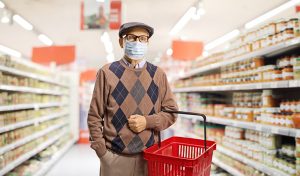
Links and product recommendations in the information provided here are advertisements of third-party products available on the website. PharmEasy does not make any representation on the accuracy or suitability of such products/services. Advertisements do not influence the editorial decisions or content. The information in this blog is subject to change without notice. The authors and administrators reserve the right to modify, add, or remove content without notification. It is your responsibility to review this disclaimer regularly for any changes.
Needless to say, Holi leads to air pollution, considering there is a tradition of throwing colours in the air as well as at people. So, there is definitely an impact on the health of those who are already suffering from respiratory disorders.
According to a medical journal published by Ira Shah on Pediatric Oncall, cheap Holi colours, including liquid colours contain harmful agents like pieces of glass, mica and acids that have severe health effects. Other than these, Holi colours can also cause skin-related allergies like dermatitis and eczema. Both of them can lead to blisters, scaly skin, irritation and itching.
So, we at Lupin India, want to emphasize, as much as we can, how essential it is for you to take safety precautions during Holi.
Some safety tips for Holi you should follow are:
Celebrate this beautiful, colourful festival with your family and friends, without compromising on your well-being.
Disclaimer: The above information has been prepared by a qualified medical professional and may not represent the practices followed universally. The suggestions listed in this article constitute relatively common advice given to patients, and since every patient is different, you are advised to consult your physician, if in doubt, before acting upon this information. Lupin Limited has only facilitated the distribution of this information to you in the interest of patient education and welfare.
 Place a heating pad or hot water bottle on your lower back or abdomen for pain relief. Rest when needed. Avoid caffeine, smoking and alcohol. Avoid popping pain medications without doctor’s advice as these medicines may have side effects in some cases. If you find that none of these self-care measures are providing relief, it is recommended to seek medical advice from your doctor. They will be able to provide proper guidance and may consider prescribing appropriate medication to help alleviate your pain and other symptoms effectively.
Place a heating pad or hot water bottle on your lower back or abdomen for pain relief. Rest when needed. Avoid caffeine, smoking and alcohol. Avoid popping pain medications without doctor’s advice as these medicines may have side effects in some cases. If you find that none of these self-care measures are providing relief, it is recommended to seek medical advice from your doctor. They will be able to provide proper guidance and may consider prescribing appropriate medication to help alleviate your pain and other symptoms effectively. Can PMDD be treated? Yes! Treatments for PMDD include-
Can PMDD be treated? Yes! Treatments for PMDD include- Links and product recommendations in the information provided here are advertisements of third-party products available on the website. PharmEasy does not make any representation on the accuracy or suitability of such products/services. Advertisements do not influence the editorial decisions or content. The information in this blog is subject to change without notice. The authors and administrators reserve the right to modify, add, or remove content without notification. It is your responsibility to review this disclaimer regularly for any changes.
Most of us who like to exercise first thing in the morning always wonder whether we should first have breakfast, or catch up with it later? It’s often recommended that you work out first thing in the morning before eating breakfast, as it is believed to help with weight loss. However, exercising after eating may give you more energy and improve your performance.
The theory is that your body feeds on fat and carbohydrates which is stored in your body for energy instead of the food you’ve recently eaten, leading to higher levels of fat loss. Working out on an empty stomach would direct your body to use the stored-up protein as fuel rather than using it to build and repair muscles after exercise.
Also, if your body uses stored fat as energy, it doesn’t necessarily mean that you are going to burn more calories or reduce your body fat percentage. This is because your body will adjust itself to using fat reserves for energy and might continue to store more fat than usual to make up for it.
Some research does support working out on an empty stomach however, it doesn’t necessarily mean that it’s the ideal way. When you exercise on an empty stomach, you may burn valuable energy sources (proteins) and have less stamina.
You will not only feel intense hunger but your stomach can also cramp. Sometimes, your blood sugar levels may drop and leave you feeling lightheaded, nauseous, dizzy or shaky.
Working out requires you to follow a well-balanced diet to improve your performance. Choose food that is natural and nutritious, eat fresh fruits and vegetables, whole grains and legumes. Add nuts, seeds and sprouts which are a rich source of iron.
If you do decide to work out after eating, choose a meal that can be digested easily and is rich in carbohydrates, fats and proteins. Eat your meal at least 2-3 hours before your planned workout. If you’re pressed for time, munch on an energy bar or fresh/ dried fruit.
A post-workout meal is equally important to improve and speed up recovery. Have a meal that is rich in carbohydrates, fats and proteins within 30 minutes to 2 hours after a workout. You can choose from options that include soymilk, smoothies, sandwich, energy bar, yoghurt, etc.
Don’t forget to drink plenty of water before, during and after your exercise.
It’s often recommended that you work out first thing in the morning before eating breakfast, in what’s known as a fasted state. This is believed to help with weight loss. However, working out after eating may give you more energy and improve your performance.
Dr. M.G. Kartheeka, MBBS, MD
Also Read: Food For Upset Stomach: A Research-Based Guide To Soothing Foods

Depending on the type of activity, you can determine whether you should eat before a workout or not. Light exercises such as yoga and walking may not require you to fuel up beforehand.
However, it’s essential that you eat before any activity that requires a lot of strength, energy and endurance, or even if you plan to work out for over an hour. These activities could include swimming or running.
Foods with a high-fibre, high-fat content, fast food or energy drink are not recommended to be consumed for at least one hour before the workout as they hinder an effective workout and make the person more full.
Dr. Ashish Bajaj, M.B.B.S., M.D.
Also Read: Why Does Your Stomach Growl: Scientific Insights into Body Sounds
To get the most out of your next workout activity, prepare by eating foods that will provide the best fuel for your body.
Foods such as Complex carbohydrates like high-protein oatmeal or homemade granola will arm you with plenty of energy to get through your next aerobic routine. Also, lean protein, like nuts and nut butter, is great for sustaining your system and keeping you full while you work out.
Schedule your pre-exercise meal about 90 minutes before your exercise. Always have an option for foods that are light and easy to digest, like fresh fruit, an energy bar, juice or a smoothie in case you need a snack closer to your workout time.
Having food in your stomach before you start working out not only makes your workout more fun but will also help you build and sustain muscle mass to achieve the optimal results you admire.
You are your own best guide, so listen to your body and do what is best for you and your body. Be happy, stay hydrated, maintain a balanced diet and live a lifestyle in line with your best health interests. Remember to always talk to your family physician/ doctor/ nutritionist before starting any new exercise program.
Also Read: What is the Best Time to Exercise?
Disclaimer: The above information has been prepared by a qualified medical professional and may not represent the practices followed universally. The suggestions listed in this article constitute relatively common advice given to patients, and since every patient is different, you are advised to consult your physician, if in doubt, before acting upon this information. Lupin Limited has only facilitated the distribution of this information to you in the interest of patient education and welfare.
We all want to put an end to bad habits but that’s a tough job, isn’t it? Eating unhealthily is one of those bad habits that you need to get rid of right away. It affects our body more than you can imagine! If you just knew these few tips, you would never want to eat like that again.
To eat healthier food, you may need to make some lifestyle changes including changes in your daily habits as well as in your environment. For example, if you don’t keep a tab of the snacks you consume in between meals, you may end up overeating. It’s ok to indulge in a healthy snack or two between meals. They can keep blood sugar steady as well as allow one to rack up more servings of fruits and vegetables.
Typical snack foods (chips, biscuits) not only lack nutrition but also are low in satiety, so it’s easy to overdo them. Rather choose something that feels like real food like half of a small sandwich, whole-grain crackers with cheese, a handful of nuts or yoghurt.
1. Do not skip on a healthy breakfast – A healthy breakfast is the most essential meal of the day. Eating breakfast helps jumpstart the metabolism, makes us feel energetic, cut cravings during the day and provides the essential vitamins and proteins required for the day. It is also considered a key to maintaining weight loss for a long time.
2. Try replacing sweets with the fruit of all kinds – Fresh, frozen, dried or tinned. Slice them and store them into plastic lidded containers in the fridge, so you have a go-to snack when you’re tempted to have sweets.
3. Chew your food properly – Gulping food may set you up for stomach troubles. Saliva begins to break down food and when food spends little time in the mouth, it leaves more work for the rest of the digestive tract. This may contribute to indigestion.
4. Turn off the television when you dine – Television makes people particularly prone to spaced-out eating. Plan and make sure that healthy snacks like fresh fruits, veggies, whole grain crackers, or nuts are ready to go when you feel the urge to munch on something. Set your table and plate your food (instead of eating directly out of the container) so that you have more control over the quantity you eat.
5. Hydrate yourself – Water is crucial for the proper functioning of your brain cells and every organ in your body (including your skin). Your body needs at least eight glasses of pure water daily to burn out fat. Water not only quenches your thirst; it decreases hunger and removes toxins. Liquids such as soda and coffee drain water from your body. So, drink plenty of water.
Eating a healthier diet may be intimidating at first. However, you have a better chance of succeeding when you see how good it makes you feel or how good healthy food can taste. Over time, your preferences will change and cravings for unhealthy foods will fade away.
Even those who manage to break their bad eating habits can easily slip into their old ways during stressful times. When you feel weak or vulnerable, the automatic response often overrides good intentions. Make sure you don’t skip or delay meals and ensure that you schedule your snacks. If you stay hungry for a longer period, you may end up eating too much or choosing an unhealthy snack.
If you have a bad eating habit, don’t be too hard on yourself. Slowly but surely change to a healthier lifestyle – you will be happy you did!
Disclaimer: The above information has been prepared by a qualified medical professional and may not represent the practices followed universally. The suggestions listed in this article constitute relatively common advice given to patients, and since every patient is different, you are advised to consult your physician, if in doubt, before acting upon this information. Lupin Limited has only facilitated the distribution of this information to you in the interest of patient education and welfare.
Next Page »« Previous Page